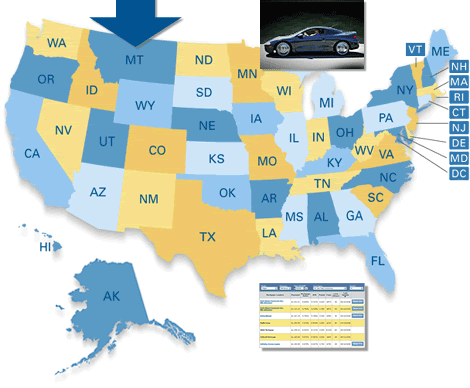Auto Insurance - The Best Plan for You
by Amy Lillard
How do you decide on auto insurance? When you buy insurance, you're protecting against something you hope never happens. But when accidents do happen, having the right amount and types of insurance is crucial.
Deciding on how much insurance you need is a complicated process. Sitting down with a broker or insurance agent can cut the confusion as you determine how much you own, how much you owe, what your assets are worth, who your dependents are, and how much out-of-pocket cost you can pay.
Knowing this information, you can navigate through the different types of coverage, the different insurance plans available, and the different premiums each company offers.
Shopping Around
Always compare different plans across insurance companies. Depending on the company and the specific details of a plan, premiums can vary by hundreds of dollars. Using sites like carinsurance.com, esurance.com, or insurance.com can help your research.
Keeping close tabs on what your specific situation is can result in more appropriate and cost-effective coverage:
Do you have a clean driving record? Your insurance costs, particularly with liability plans, should be lower.
Can you afford a higher deductible? If you can swing higher out-of-pocket costs in the case of an accident, choose as high a deductible as possible. This reduces your monthly premiums.
Do you need two or more types of insurance? If you're looking for both auto and life insurance, or auto and home insurance, some brokers will offer quantity discounts.
Do you have more than one car? You might receive a discount for multiple cars in the same family.
Do you drive a limited amount over the year? If you drive less than 7500 miles a year, for example, you may receive an insurance discount.
Do you have safety and anti-theft measures on your car? If your new or current car has anti-lock brakes, automatic seat belts, airbags, or anti-theft devices such as car alarms and tracking systems, you might get a discount.
Contracts and Review
Before signing on the dotted line, ensure that you understand the policy and its terms on:
Who or what is covered
What the plan covers and what it does not
When the coverage begins and ends
How much you'll pay (the premium)
How you file a claim
Car insurance should change when your life changes. Reviewing your insurance on an annual or biannual basis can ensure that your coverage still works for you and your family. In addition, there are certain times you always re-evaluate your insurance needs, such as marriage or divorce, starting a family, buying a house, starting a new job, sending a child to college, or retirement.
To learn more about auto insurance, read our continuing series, including articles on common types of coverage, how to file claims, tips for after an accident, and more.
 A frequent contributor to ERATE® since 2006, Amy Lillard is a freelance writer specializing in turning complex information into useful tips and tricks for readers. For questions or topic suggestions, contact Amy at [email protected].
A frequent contributor to ERATE® since 2006, Amy Lillard is a freelance writer specializing in turning complex information into useful tips and tricks for readers. For questions or topic suggestions, contact Amy at [email protected].
Other Articles:
Auto Insurance - Finding the Best Plan for You
Auto Loans Advice: New Cars & Used Cars
Car Buying vs Car Leasing
Life Insurance Overview
Tips on Buying Long-Term Care Insurance
New and Used Auto Loan Rates
Choose Your State Below

Start by selecting your state

Life Insurance
- Term, Whole, Universal, Varialble Life Insurance
- Guidelines for Purchasing Life Insurance
- Life Insurance: Finding the Best Rates
- Life Insurance Explained: Types and Coverage

Medical Insurance
- Health Insurance Basics
- Healthcare Costs and Retirement
- Critical Flaws in HealthCare
- Disability Insurance
- Tips on Buying Long Term Care Insurance
General Insurance Articles

Homeowners Insurance
- Homeowners Insurance Premiums Policy
- Homeowners Insurance: Filing a Claim
- Punxsutawney Phil's forecast-homeowners insurance rates
- Homeowners Insurance Costly Trends
- Home Insurance Costs on the Rise, Coverage Options Decrease
- Homeowners Insurance: The Special Policy for Condo Owners
- Homeowners Insurance College Students Coverage
- Underinsured Homeowners
- Beyond Homeowners Insurance: Coverage for Renters
- What Home Owners Insurance Do You Need? Tips for the Best
- Home Insurance Quotes: Types of Home Owners Insurance
- Home Insurance: How are Insurance Quotes Determined?
- Homeowners Insurance: Finding the Best Quotes


Auto Insurance

- Hitting the brakes on auto insurance costs
- Car Insurance Quotes: Discovering best deals
- Car Ins Quotes: What Factors Determine Rates
- Auto Insurance Quotes and Policies: Commonly Used Terms
- Shopping Prep: What You'll Need to Obtain Car Insurance Quotes
- Auto Insurance Terms & Descriptions
- Understanding Your Auto Insurance Quotes: The 7 Types of Car Insurance
- Auto Insurance - Best Plan for You
- How much Car Insurance to buy
- Need to Know Auto Ins Policy
- Automobile Insurance Settlement Advice
- Managing Auto Insurance: What to Do After an Accident
- Filing a Car Insurance Claim: Steps to Follow after an Accident
- Auto Insurance Steps to Filing a Claim
- Tips - Reducing your Auto Insurance Expenses
- Driving a Hard Bargain
- Slow Down Drive Safely
- Cheapest & Most Expensive Vehicles to Insure
